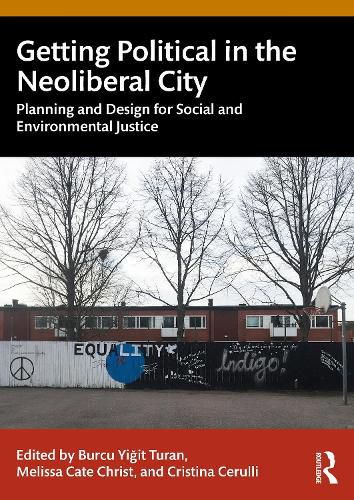Readings Newsletter
Become a Readings Member to make your shopping experience even easier.
Sign in or sign up for free!
You’re not far away from qualifying for FREE standard shipping within Australia
You’ve qualified for FREE standard shipping within Australia
The cart is loading…






In a world defined by ever-deepening crises-climate, social, economic, and political-urban spaces emerge as both battlegrounds of injustice and the arenas of possibility. Getting Political in the Neoliberal City interrogates the roles of planners, architects, designers, and urban citizens in challenging the pervasive inequities of neoliberal urbanism. Drawing from critical case studies spanning continents and disciplines, this volume reframes the intersections of spatial and social justice to illuminate how space becomes a site of power, exclusion, and potential resistance.
Through incisive essays and reflective scholarship, this book explores how cities are shaped by market forces and neoliberal governance, yet also serve as sites for insurgent practices at various scale, grassroots movements, and alternative imaginaries that resist dominant modes of urbanization and claim just ways of making cities. Highlighting the emergencess of new epistemologies, subjectivities and critical agencies, Getting Political in the Neoliberal City calls for a transformative rethinking of urban and environmental planning, design, and citizenship.
Featuring contributions from scholars and practitioners in diverse fields, including architecture, geography, political science, and anthropology, the book maps the tensions between depoliticized scholarly and professional practices and the urgent need for politicized action. With compelling examples from Australia, Brazil, Cyprus, Denmark, Germany, Hong Kong, the USA, and Sweden, this book offers fresh insights into ongoing research on the struggles for more equitable, inclusive, and environmentally just cities. It also provides opportunities to understand the historical contextuality of each case and to reflect on the nuances, similarities, and global connections between different cases across different geographies.
$9.00 standard shipping within Australia
FREE standard shipping within Australia for orders over $100.00
Express & International shipping calculated at checkout
In a world defined by ever-deepening crises-climate, social, economic, and political-urban spaces emerge as both battlegrounds of injustice and the arenas of possibility. Getting Political in the Neoliberal City interrogates the roles of planners, architects, designers, and urban citizens in challenging the pervasive inequities of neoliberal urbanism. Drawing from critical case studies spanning continents and disciplines, this volume reframes the intersections of spatial and social justice to illuminate how space becomes a site of power, exclusion, and potential resistance.
Through incisive essays and reflective scholarship, this book explores how cities are shaped by market forces and neoliberal governance, yet also serve as sites for insurgent practices at various scale, grassroots movements, and alternative imaginaries that resist dominant modes of urbanization and claim just ways of making cities. Highlighting the emergencess of new epistemologies, subjectivities and critical agencies, Getting Political in the Neoliberal City calls for a transformative rethinking of urban and environmental planning, design, and citizenship.
Featuring contributions from scholars and practitioners in diverse fields, including architecture, geography, political science, and anthropology, the book maps the tensions between depoliticized scholarly and professional practices and the urgent need for politicized action. With compelling examples from Australia, Brazil, Cyprus, Denmark, Germany, Hong Kong, the USA, and Sweden, this book offers fresh insights into ongoing research on the struggles for more equitable, inclusive, and environmentally just cities. It also provides opportunities to understand the historical contextuality of each case and to reflect on the nuances, similarities, and global connections between different cases across different geographies.